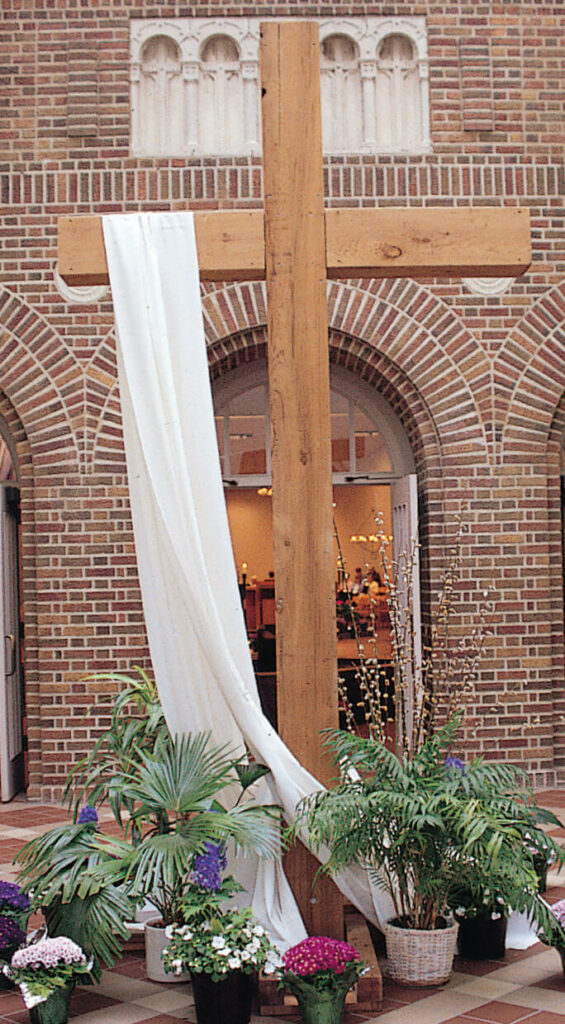
The two disciples who leave Jerusalem and head home to Emmaus in Sunday’s gospel have experienced a terrible loss. As disciples, they wrapped their lives around Jesus, whom they expected would usher in the reign of God. Their hopes die at his crucifixion. The two disciples are walking away from not only the fact of Jesus’ death but also from disturbing reports that he has been raised up.
The mystery of God’s ways escapes the two, even though earlier Jesus told his disciples that in Jerusalem he would suffer, die, and be raised up. The disciples’ expectation that their journey with Jesus will end in earthly triumph blinds them to the presence of God in the unprecedented and bewildering events unfolding around them. They handle their confusion by retreating to a comfortable place they once came from.
Emmaus lies seven miles from Jerusalem, a walk long enough for a transforming conversation. The walk represents a whole process of moving from loss to new life, from blindness to faith.
- When have you experienced your hopes die?
- Who has helped rekindle your lost hopes?
Luke draws on Second Isaiah, the prophet of Israel’s exile in Babylon, to express the meaning of Jesus’ suffering, death, and resurrection. The prophet speaks in Isaiah 40-55. He writes four songs that describe the people collectively as God’s suffering servant, who bears “the punishment that makes us whole, and by whose wounds we were healed” (53.5).
In their return from exile the people become a revelation of God’s faithfulness. “It is too little for you to be my servants,” Second Isaiah says on God’s behalf, “I will make you a light to the nations that my salvation may reach to the ends of the earth” (49.59-60). The people discover God remembers them, can act in this foreign land, and acts through the foreign leader, Cyrus of Persia, to return them home.
These are passages that suggest the messiah had to suffer death to enter his glory, but on Monday after Jesus’ resurrection the two disciples don’t have this insight yet. During 50 years of telling Jesus’ story orally, the early Christian communities develop these insights that the written gospels proclaim.
In Luke’s gospel neither Mary Magdalene nor any of the women who find the tomb empty remember the worrisome words Jesus spoke earlier until the two men awaken their memories. “Remember how he told you while he was still in Galilee that the Son of Man would be handed over to sinners and be crucified and on the third day rise again” (24.6-7). Then they remember.
“Didn’t the messiah have to suffer to enter into his glory?” the stranger asks. Yes, answers Luke’s gospel. Luke echoes Jesus’ passion predictions in the words of the stranger and the words of the angels to the women. This opens the scriptures in a new way and rekindles the disciples’ hopes.
- When have your expectations blinded you to the presence of God at work in your life?
- With what contradictions do you wrestle in reflecting on Jesus’ death and resurrection?
“Stay with us, for it is nearly evening.”
In the Emmaus story the risen Jesus becomes present to the two disciples first through interpreting the scriptures together and then through breaking bread, the same ways Jesus becomes present in every Eucharist. In extending hospitality to the stranger, the disciples welcome a guest for supper who turns out to be their host at the last supper and whom the reader recognizes as the host of every Eucharist.
Their hospitality toward a stranger rewards the two disciples, but as soon as they recognize Jesus, he vanishes. Their recognition is the seeing of faith. They begin to piece together a new vision.
They remember how their hearts burned within them as the stranger explained the scriptures and revived their hopes. And they met Jesus in the breaking of the bread because they wanted to hear more and invited him to dinner, “Stay with us, for it is nearly evening.”
- What role is most transforming in your experience—guest or host?
- Who do you urge to stay in your life?
- What makes your heart burn with hope in all the human race can become?
